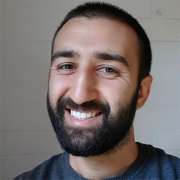
Name: George (Kev) Dertadian
Position/s: Senior Lecturer in Criminology
Project: Experience of Safety, Harassment and Social Exclusion Among Male Clients of Sydney’s Medically Supervised Injecting Centre
Can you please tell us about the project and why it is needed?
Much has been research and written about the health benefits of harm reduction services like the Sydney Medically Supervised Injecting Centre, including reducing overdose and the transmission of blood borne viruses (such as HIV and Hepatis C). Less however is known about how the service provides clients with a reprieve from the harassment and violence they are subject to on a daily basis.
Who are the project team?
Kev Dertadian is a social researcher who conducts field-based research with people who use drugs, including the non-medical use of pharmaceutical opioids and injecting drugs use. Kev advocates for non-carceral responses to drug use, with a particular focus on harm reduction. He is currently a Senior Lecturer in a Criminology as part of the School of Law, Society and Criminology in the Faculty of Law and Justice at the University of New South Wales.
Stephen Tomsen is a Professor of Criminology and Criminal Justice at Western Sydney University.
What are you hoping to achieve in this project?
To highlight the wider social benefits of supervised drug consumption facilities that go hand in hand with the health benefits. For example, in our research with clients of the Sydney facility we found the centre acts as a safe haven from the general insecurity of their daily lives. For clients, access to the centre is credited with a range of health outcomes not traditionally associated with consumption rooms, such as reduced drug use, securing and keeping employment and finding stable accommodation. We also found that the centre provides protection from constant harassment by members of the public and reprieve from serious violence in the drug market. Importantly, our research also found that instances of overzealous and brutal conduct by police is a common experience for clients.
What impact do you imagine the project will have?
In the context of consistent calls to expand the number of supervised drug consumption sites in Sydney, the public is best served by having a fuller understanding of the role these services play in reducing harm. Explaining the full range of health benefits (beyond saving lives) provided by supervised consumption rooms encourages the development of public support for evidence-based public policy to respond to drug-related harm. Moreover, providing an explanation of the way people who inject drugs are subject to structural forms of marginalisation and violence is key to illustrating the limitations and even harms of prohibitionist policy approaches.
Is there any call to action or collaboration needs you would like to highlight?
While our study focussed on men, these findings are likely to be applicable to and perhaps even more intense for women, transgender and gender diverse people who use the service, which is illustrated by research with harm reduction services in other contexts, and the increased violence experience by such groups who inject drugs.
Recently published papers on this project:
Dertadian, G. & Tomsen, S. (2021) The Experience of Safety, Harassment and Social Exclusion Among Male Clients of Sydney’s Medically Supervised Injecting Centre. International Journal for Crime, Justice and Social Democracy, 10(4), 1-12.

